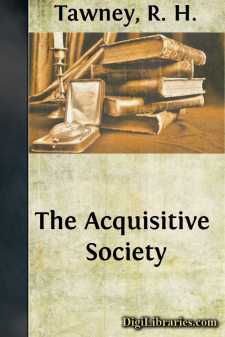Categories
- Antiques & Collectibles 13
- Architecture 36
- Art 48
- Bibles 22
- Biography & Autobiography 813
- Body, Mind & Spirit 142
- Business & Economics 28
- Children's Books 17
- Children's Fiction 14
- Computers 4
- Cooking 94
- Crafts & Hobbies 4
- Drama 346
- Education 46
- Family & Relationships 57
- Fiction 11829
- Games 19
- Gardening 17
- Health & Fitness 34
- History 1377
- House & Home 1
- Humor 147
- Juvenile Fiction 1873
- Juvenile Nonfiction 202
- Language Arts & Disciplines 88
- Law 16
- Literary Collections 686
- Literary Criticism 179
- Mathematics 13
- Medical 41
- Music 40
- Nature 179
- Non-Classifiable 1768
- Performing Arts 7
- Periodicals 1453
- Philosophy 64
- Photography 2
- Poetry 896
- Political Science 203
- Psychology 42
- Reference 154
- Religion 513
- Science 126
- Self-Help 84
- Social Science 81
- Sports & Recreation 34
- Study Aids 3
- Technology & Engineering 59
- Transportation 23
- Travel 463
- True Crime 29
The Acquisitive Society
by: R. H. Tawney
Description:
Excerpt
INTRODUCTORY
It is a commonplace that the characteristic virtue of Englishmen is their power of sustained practical activity, and their characteristic vice a reluctance to test the quality of that activity by reference to principles. They are incurious as to theory, take fundamentals for granted, and are more interested in the state of the roads than in their place on the map. And it might fairly be argued that in ordinary times that combination of intellectual tameness with practical energy is sufficiently serviceable to explain, if not to justify, the equanimity with which its possessors bear the criticism of more mentally adventurous nations. It is the mood of those who have made their bargain with fate and are content to take what it offers without re-opening the deal. It leaves the mind free to concentrate undisturbed upon profitable activities, because it is not distracted by a taste for unprofitable speculations. Most generations, it might be said, walk in a path which they neither make, nor discover, but accept; the main thing is that they should march. The blinkers worn by Englishmen enable them to trot all the more steadily along the beaten road, without being disturbed by curiosity as to their destination.
But if the medicine of the constitution ought not to be made its daily food, neither can its daily food be made its medicine. There are times which are not ordinary, and in such times it is not enough to follow the road. It is necessary to know where it leads, and, if it leads nowhere, to follow another. The search for another involves reflection, which is uncongenial to the bustling people who describe themselves as practical, because they take things as they are and leave them as they are. But the practical thing for a traveler who is uncertain of his path is not to proceed with the utmost rapidity in the wrong direction: it is to consider how to find the right one. And the practical thing for a nation which has stumbled upon one of the turning-points of history is not to behave as though nothing very important were involved, as if it did not matter whether it turned to the right or to the left, went up hill or down dale, provided that it continued doing with a little more energy what it has done hitherto; but to consider whether what it has done hitherto is wise, and, if it is not wise, to alter it. When the broken ends of its industry, its politics, its social organization, have to be pieced together after a catastrophe, it must make a decision; for it makes a decision even if it refuses to decide. If it is to make a decision which will wear, it must travel beyond the philosophy momentarily in favor with the proprietors of its newspapers. Unless it is to move with the energetic futility of a squirrel in a revolving cage, it must have a clear apprehension both of the deficiency of what is, and of the character of what ought to be. And to obtain this apprehension it must appeal to some standard more stable than the momentary exigencies of its commerce or industry or social life, and judge them by it....


